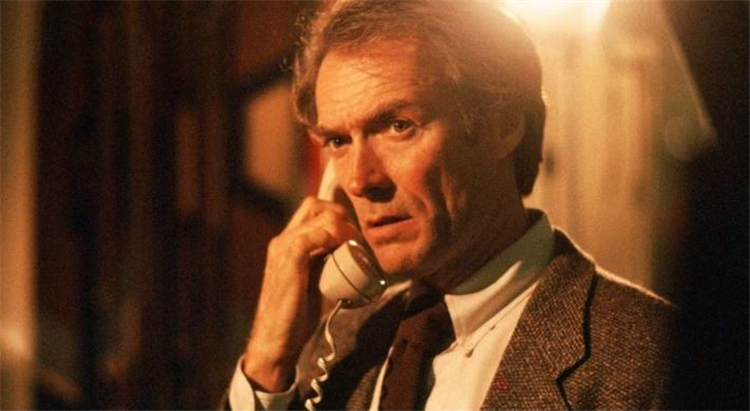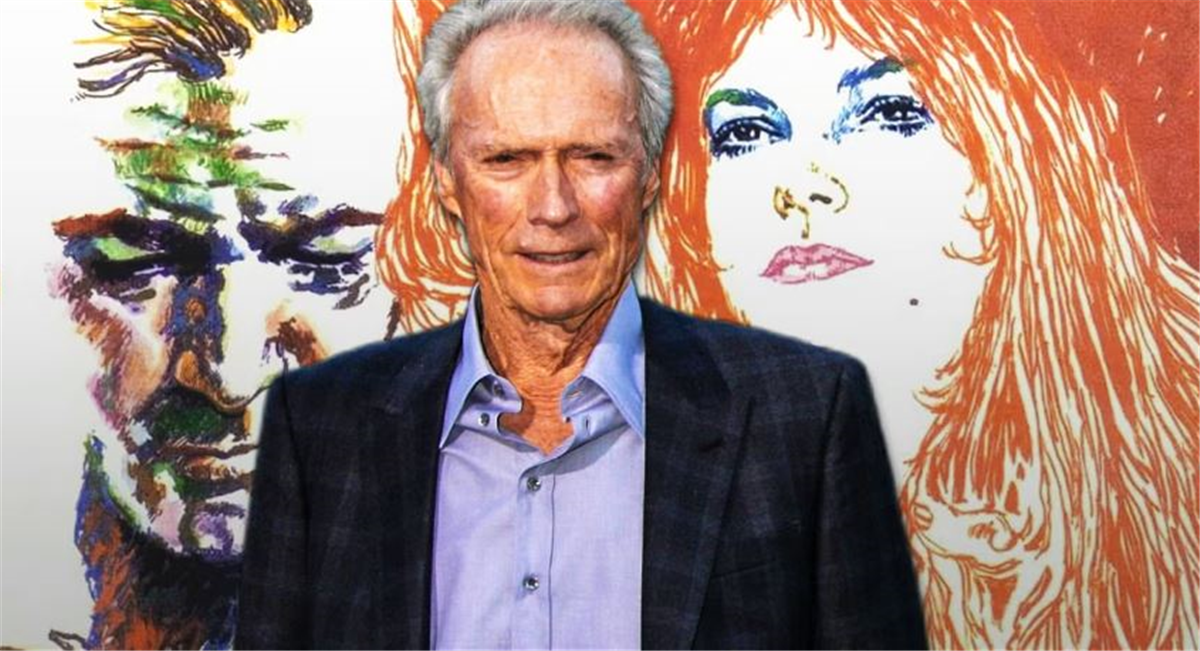Some actors are linked forever to certain genres: Humphrey Bogart and film noir, Hugh Grant and romantic comedies, Clint Eastwood and Westerns. And yet, just because an actor might be tied indelibly to a certain genre doesn’t necessitate that it’s one of their personal favorites.
The aforementioned Clint Eastwood is a living legend to Cowboy enthusiasts everywhere, but the one movie he loves the most has nothing to do with the Wild West at all. Instead, it’s a revolutionary noir comedy helmed by one of the most talented screenwriters of any generation, Billy Wilder. Moreover, the potential impact this seminal film had on Clint’s career is worth exploring.
So, What Is Clint Eastwood’s Favorite Film?
A Movie About the Greatest Star of Them All
During a joint interview featuring Clint Eastwood and his son, Scott, that ran in Esquire in 2016, the longtime industry veteran and one of the most famous actor/director combos on the planet told the media outlet that his all-time favorite movie was one no one probably expected: Billy Wilder’s Sunset Boulevard. This black comedy is so utterly dark that it doubles as a film noir, two genres that Clint, as both an actor and a director, has relatively little experience with.
But if Sunset Boulevard has little to do with the many films Clint Eastwood has made throughout his career, then why does he love it so much? Well, according to the former Dirty Harry, it all comes down to the film’s ability to combine different styles. He told Esquire,
“Two different styles: the style of the silent-movie actress, and then with William Holden’s character, someone more contemporary. The two styles working so well together. And I always liked Billy Wilder.”
Of course, Clint Eastwood isn’t the only person who holds Sunset Boulevard to such high acclaim. The film is often considered to be one of the defining movies of the 1950s and one of the best to ever come out of the Hollywood studio system.
What Is Sunset Boulevard About, and What Makes it Great?
Breaking the Fourth Wall (and Myths) Regarding Hollywood

Sunset Boulevard is one of those classic movies that, despite being over seven decades old, is still taught in film theory classes all around the world today. Written and directed by industry titan Billy Wilder, the film stars William Holden as a struggling screenplay writer named Joe Gillis who finds himself employed by the former silent-film era superstar Norma Desmond, played unforgettably by Gloria Swanson.
As one of the biggest stars of her generation, Norma Desmond hopes to transition into talking pictures but is having a very difficult time doing so. She’s a woman trapped in the past and imprisoned by her memories of past glories. Now that her roles have all but dried up, she doesn’t know where to turn next and is desperately trying to make her comeback. Meanwhile, Joe Gillis is drawn into Desmond’s web, intrigued by her former glamor and remnants of wealth. With her help, he hopes to find the fame and success he has so long sought, but neither of these characters will get what they want.
At the time of its release, Sunset Boulevard was nominated for 11 Academy Awards, winning three: Best Story and Screenplay, Best Art Direction-Set Direction Black and White, and Best Score. It was also nominated in all four of the acting categories, as well as Best Picture and Best Director, awards that the film very much arguably should have walked away with (and probably would have if Joseph L. Mankiewicz’s All About Eve hadn’t been released that same year). Today, Sunset Boulevard is largely considered to be one of the best films ever made and has rightly been added to the Library of Congress’s National Film Registry.
What makes Sunset Boulevard so powerful is that it offers a one-of-a-kind, behind-the-scenes look into the movie-making business. Norma Desmond isn’t just an actress whose star has begun to fade; she’s a woman losing her grip on all sense of reality itself. While remaining in her own perfect, solitary world at home, she sees herself as the toast of Hollywood, but when she steps foot outside, cold, hard reality inevitably sets in. Those same skills and talents that once made her the perfect silent film star (like exaggerated facial expressions and reactions) are the same things that are holding her back in an era that requires far less artifice.
The fourth-wall-breaking meta-nature of Sunset Boulevard is another big reason why the film is so fantastic. Billy Wilder digs further into Norma’s desperation by not only casting a real-life former silent film superstar like Gloria Swanson but also the silent film director Erich von Stroheim in the role of Norma’s butler and ex-husband, Max von Mayerling. Both Gloria Swanson and Erich von Storheim had worked together in real life on silent movies like Queen Kelly, a film that the character of Norma Desmond watches in Sunset Boulevard while trying to relive the glory days of her past.
In short, Sunset Boulveard captures one of the most important transitional moments in Hollywood’s history and provides a painful dose of reality by telling the story of a former Hollywood great who was chewed up and spit out by the same system she dedicated her entire life to. It’s the kind of story that you could see another Hollywood legend like Clint Eastwood relating to more and more the older he became. And while it’s unquestionable that Clint Eastwood loves Sunset Boulevard, has this movie really affected his career?
How Has Sunset Boulevard Influenced Clint Eastwood’s Directorial Career?
His Style Remains a Relic of the Past

Odds are, you haven’t seen Clint Eastwood get too deep about his filmmaking craft. Much like his infamous character, the Man With No Name, Clint has always been someone of relatively few words. All of which is to say that how exactly Sunset Boulevard influenced his sense of style is something that only he truly knows for sure, and he isn’t about to tell any of us the specifics. That said, there are a few general ways in which this film seems to have impacted his career.
First and foremost was the shockingly assured start of Clint Eastwood’s directorial career with the psychological thriller Play Misty For Me. Stepping behind the camera for the first time in his life, Clint chose to direct a movie that required a precise sense of timing to make sure the scares came off just right, and that’s something he could have only learned how to do by studying the craft of master filmmakers like Billy Wilder, suggesting that much of Eastwood’s free time really was spent watching the films of the greats who came before him.
In terms of story and a peek behind the Hollywood curtain, the only film that Clint Eastwood has ever made that plays in that same space is White Hunter, Black Heart, a fictionalized retelling of John Huston’s adventures in Africa while making The African Queen. That movie lacks the same sense of humor found in Sunset Boulevard, but it’s still very much an indictment on the industry, much like its progenitor.
In general, Clint Eastwood’s directorial style could be categorized as understated and minimal, two things that Billy Wilder (as both a person and an artist) decidedly was not. At the same time, Eastwood has always embraced the more classical sensibilities of artists from Wilder’s era to let a story play out in long wide shots without using fast-paced editing techniques to drum up (unearned) excitement. In that sense, Eastwood is very much cut from the same cloth as Wilder, if in no other way.
Clint Eastwood and Norma Desmond remain two titans of the Hollywood movie industry—one fictional, the other real. Whereas Norma was unable to reinvent herself with the changing tide, Eastwood has never had much of a problem maintaining his relevancy. Perhaps because, unlike Norma, there was always something relatively simple at the heart of his performances.
Or maybe it’s because Clint Eastwood has long had the cautionary tale of Sunset Boulevard to live by, and he’s used it as a guiding light to make sure the same thing that happened to Norma Desmond never happened to him. Considering the man is still making movies well into his 90s, it’s safe to say that he, like Norma, will always be ready for his close-up, whether he’s behind the camera or in front of it.
